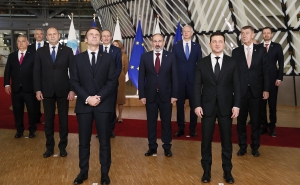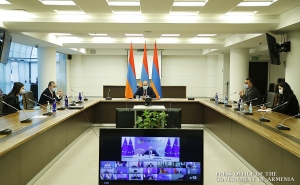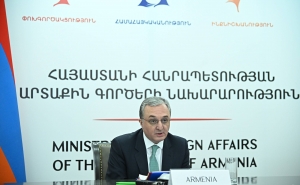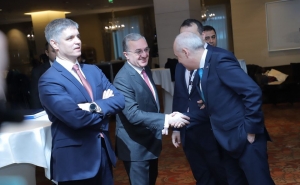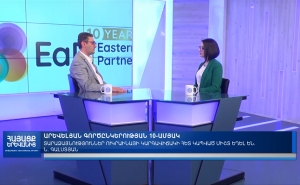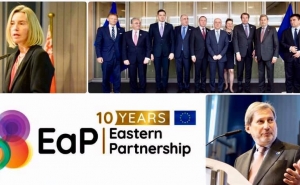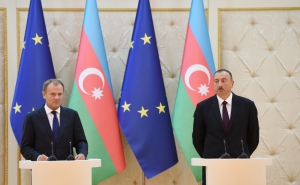Joint Declaration of the Eastern Partnership Summit: FULL TEXT

Below is full-text of the Joint Declaration of the Eastern Partnership Summit (Riga, 21-22 May 2015).
The Heads of State or Government and the representatives of the Republic of Armenia, the
Republic of Azerbaijan, the Republic of Belarus, Georgia, the Republic of Moldova and Ukraine,
the representatives of the European Union and the Heads of State or Government and
representatives of its Member States have met in Riga on 21-22 May 2015. The President of the
European Parliament and representatives of the Committee of the Regions, the European Economic and Social Committee, the European Investment Bank and the European Bank for Reconstruction and Development, the Conference of Regional and Local Authorities of the Eastern Partnership and the Euronest Parliamentary Assembly were also present at the Summit.
1. The participants of the Riga summit reconfirm the high importance they attach to the Eastern
Partnership as a specific dimension of the European Neighbourhood Policy. They reaffirm
their shared vision of this strategic and ambitious Partnership as one based on mutual interests
and commitments and supporting sustained reform processes in the Eastern European partner
countries, States participating in the Eastern Partnership. Summit participants recommit
themselves to strengthen democracy, rule of law, human rights and fundamental freedoms, as
well as the principles and norms of international law, which are and have been at the heart of
this Partnership since it was launched as a common endeavour of the Member States of the
European Union and their Eastern European partners. They recall that the Eastern Partnership
is founded on shared ownership, responsibility, differentiation and mutual accountability.
They underline the importance of the engagement of all society in turning this shared vision
into reality.
2. In the framework of the European Neighbourhood Policy and the Eastern Partnership, the
Summit participants reaffirm the sovereign right of each partner freely to choose the level of
ambition and the goals to which it aspires in its relations with the European Union. It is for the
EU and its sovereign partners to decide on how they want to proceed in their relations. The
Summit participants underline that strengthening democracy and enabling functioning market
economies, improving macroeconomic stability and the business environment, as well as
enhancing interconnectivity, mobility and people-to-people contacts open new prospects for
cooperation, contributing also to trade, growth and competitiveness. This serves the shared
commitment to stability, security and prosperity of the European Union, Eastern European
partners and our entire continent.
3. The acts against Ukraine and the events in Georgia since 2014 have shown that the
fundamental principles of sovereignty and territorial integrity within internationally
recognised borders cannot be taken for granted in the 21st century on the European continent.
The EU remains committed in its support to the territorial integrity, independence and
sovereignty of all its partners. Full adherence to all the principles and commitments enshrined
in the 1975 Helsinki Final Act and 1990 Charter of Paris by all OSCE Participating States, as
well as full respect for the principles and provisions of the UN Charter, is critical to our vision
of a free, democratic, peaceful and undivided Europe. The participants of the Summit stress
that the Eastern Partnership aims at building a common area of shared democracy, prosperity,
stability and increased cooperation and is not directed against anyone. In this context, the
Summit participants express their willingness to help rebuild trust and confidence on our
continent.
4. The Summit participants strongly support all efforts aimed at de-escalation and a political
solution based on respect for Ukraine's independence, sovereignty and territorial integrity.
They call on all parties to swiftly and fully implement the Minsk Agreements of September
2014 and the package of measures for their implementation of February 2015, supported by
the quadrilateral Declaration of Heads of State and Government, and endorsed by UNSC
Resolution 2202 of 17 February 2015. They expect all parties to honour their commitments in
this framework. They call for the urgent release of all hostages and unlawfully detained
persons. They express their full support for the OSCE and its efforts through the Special
Monitoring Mission and the Trilateral Contact Group. They will also continue to support all
diplomatic efforts within the Normandy format and appreciate the contribution of Belarus in
facilitating negotiations. The Summit participants call upon all parties to fully cooperate with
the international investigations and criminal proceedings to hold to account those who are
responsible for the downing of MH17. The EU reaffirms its positions taken in the Joint
Statement made at the EU-Ukraine Summit on 27 April, including on the illegal annexation of
Crimea and Sevastopol. The Summit participants reaffirm their positions in relation to 'UN
General Assembly Resolution 68/262 on the territorial integrity of Ukraine'.
5. The Summit participants emphasize the need for the earliest peaceful settlement of the
conflicts in the region on the basis of the principles and norms of international law. The
resolution of conflicts, building trust and good neighbourly relations are essential to economic
and social development and cooperation. The Summit participants welcome the EU's
contribution to further promoting stability and confidence building, and underline the need for
stronger EU engagement in this regard. They welcome the EU's strengthened role in conflict
resolution and confidence building efforts in the framework or in support of existing agreed
formats and processes, including through field presence when appropriate. They highlight the
importance of advancing the negotiations in the 5+2 format on a comprehensive political
settlement of the Transnistrian conflict and welcome intensified Chisinau-Tiraspol dialogue in
all formats. They reiterate their full support to the mediation efforts by the co-chairs of the
Minsk Group on the Nagorno-Karabakh conflict, including at the level of Presidents and their
statements since 2009. Recalling the need to fully implement the 12 August 2008 Ceasefire
Agreement, Summit participants reiterate their commitment to conflict resolution efforts in
Georgia, including through the co-chairmanship of the Geneva International Discussions by
the EU Special Representative for the South Caucasus and the crisis in Georgia and the full
implementation of the mandate of the EU Monitoring Mission in Georgia. Participants stress
the specific role of the OSCE, as an inclusive organisation, in conflict resolution in the region.
The Summit participants also agree to intensify cooperation between the EU and Eastern
European partners in international fora.
6. Summit participants reaffirm the Eastern Partnership objective to develop strengthened,
differentiated relations between the EU and its six sovereign, independent partners. The scope
and depth of cooperation are determined by the EU's and partners' ambitions and needs as
well as the pace of reforms.
7. Summit participants reconfirm elements and principles embodied in Eastern Partnership
Summit Declarations and underline their firm intention to carry forward the commitments
taken at previous Summits and in bilateral agreements. Summit participants recognise that
democracy, respect for human rights and fundamental freedoms, and the rule of law lie at the
heart of political association and economic integration as envisaged in the Association
Agreements. They recognise the commitment of the partners concerned to implementing and
promoting these values. Summit participants acknowledge the European aspirations and
European choice of the partners concerned, as stated in the Association Agreements.
8. Summit participants underline that the Eastern Partnership continues to serve as the inclusive
framework for cooperation and dialogue aimed at long-term, comprehensive modernisation
reforms. They remain committed to ensuring that the full potential of this partnership is
reached, building on achievements to date. The Summit discussions on the strengthening of
relations between the EU and its partners will also inform the ongoing review of the European
Neighbourhood Policy. The Summit participants encourage all sections of their societies to
contribute to this review.
9. The participants of the Summit reviewed and welcomed the significant achievements in the
Eastern Partnership since the Vilnius Summit in 2013, notably the signing and provisional
application of the Association Agreements (AA) with Georgia, the Republic of Moldova and
Ukraine, which constitute a major step in accelerating these partners' political association and
economic integration with the EU. The Summit participants stress that implementation of
AA/DCFTAs will be a top priority of the EU and the partners concerned for the coming years.
It is the key means of achieving sustainable democracy and the deep modernisation of these
partners' economies and societies for which their citizens are calling. Summit participants
look forward to the provisional application of the Deep and Comprehensive Free Trade Area
(DCFTA) with Ukraine starting on 1 January 2016 and the positive impact its implementation
will bring about. Constructive efforts in the trilateral consultations on EU-Ukraine DCFTA
implementation, using the existing flexibilities available to the contracting parties within the
DCFTA, are important. They welcome the completion of ratification procedures in a majority
of EU Member States and call on the remaining Member States to follow suit to enable early
and full entry into force of these agreements.
10. The Summit participants welcome the successful start of the implementation of the
Association Agreements. They take positive note of the increase in trade between the EU and
Georgia and the Republic of Moldova respectively since the application of the DCFTAs.
Association Councils have held their first meetings to review and guide the implementation of
the agreements. The EU has provided and will continue to provide, notably via the European
Neighbourhood Instrument (ENI), significant support and dedicated programmes, including in
institution-strengthening and public administration reform, to bolster all three partners'
capacity to carry forward comprehensive reform which is essential in order to draw maximum
benefit from the AA/DCFTAs. The DCFTA Facility for SMEs, a new joint initiative of the
European Commission, the EIB and the EBRD, will unlock important new investments to
support SMEs in taking full advantage of the new business opportunities arising from the
AA/DCFTAs. The EU's incentive-based approach ("more-for-more") will benefit those
partners most engaged in reforms. EU financial support to all its partners will be conditioned
by concrete reform steps.
11. The Summit participants stress that the implementation of AA/DCFTAs, accompanied by
reforms, will bring about the comprehensive approximation with EU legislation and standards
leading to the gradual economic integration of partners in the EU internal market and
therefore to the creation of an economic area. The Summit participants agree that such an
ambitious long-term vision for economic integration between partners concerned and the EU
is desirable – contributing also to the longer term goal of a wider area of economic prosperity
based on WTO rules and sovereign choices throughout Europe and beyond. Participants
remain committed to continuing to encourage trade between the EU, Eastern European
partners and their trading partners.
12. Summit participants welcome the steps taken since the Vilnius Summit in 2013 in developing
differentiated bilateral relations between the EU and each of its partners. Participants
welcome the common understanding reached on the scope for a future agreement between the
EU and Armenia aimed at further developing and strengthening their comprehensive
cooperation in all areas of mutual interest. Participants also welcome the progress made in
defining a stronger basis for an upgraded contractual framework for EU-Azerbaijan bilateral
relations in all areas of mutual interest. Participants welcome the steps taken in EU-Belarus
relations and look forward to the follow-up on the Interim Phase on modernisation, including
some possible projects, and the resumption of the EU-Belarus Human Rights Dialogue.
13. The participants of the Summit stress the importance of the continued intensification of result oriented multilateral cooperation within the Eastern Partnership at all levels, including the 4
multilateral platforms and welcome the holding of ministerial meetings and conferences
across a wide range of sectors, including Justice and Home Affairs, Trade, Digital Economy,
Health and Agriculture in the first half of 2015. They also continue to underline the
importance of Informal Partnership Dialogues as a venue for informal discussions among
foreign ministers and for informal exploration of new areas of sectoral cooperation. In this
context, they look forward to the next Dialogue to be held in Minsk in June and to the further
development of cooperation in the field of environment, which remains an important area of
cooperation in the Eastern Partnership. Gender equality is a promising new area of
cooperation.
14. The Summit participants note the progress made in the cooperation taking place under the
Eastern Partnership Flagship Initiatives notably on Integrated Border Management, Small and
Medium Enterprises, energy issues, environment and climate change and natural and man-made
disasters. These initiatives contribute to demonstrating to citizens the tangible benefits
brought about by the Partnership through effective, practical projects. The Summit
participants welcome the launch of the new Flagship Initiative on Sustainable Municipal
Development and look forward to its implementation. In this context they emphasize the
important role of the E5P (Eastern Europe Energy Efficiency and Environment Partnership)
and the progress reached in extending the E5P to Armenia, Georgia and the Republic of
Moldova, in addition to Ukraine.
15. Acknowledging the significance of Eastern Partnership multilateral cooperation, the Summit
participants stress the importance of ensuring coherence between various relevant regional
initiatives and networks. They recall that the Eastern Partnership could help develop closer
ties among its partners.
16. The Summit participants welcome the implementation of the Eastern Partnership Visibility
Strategy and agree on the need to strengthen strategic communication efforts, including
exchanges and activities involving the EU, its Member States and interested Eastern European
partners, on the basis of the shared values and benefits which Eastern Partnership cooperation
brings. They underline the important role that media plays in a democratic society and
welcome the outcome of the Media Conference held in Riga on 20 May and confirmed their
continued support for media freedom.
17. The Summit participants affirm their goal to achieve an ambitious and global climate change
agreement in December at the Paris CoP 21 in order to keep global warming within the limit
of 2oC. In this regard, they welcome the submission of the EU's intended nationally
determined contribution, as well as partners' intention to submit theirs as soon as possible, and
urge all other parties to do so as well.
18. In fulfilment of the objectives of the Eastern Partnership, the full use of the ENI including,
where relevant, cross-border and territorial cooperation programmes, will be essential.
Furthermore, Summit participants stress the importance of the European Neighbourhood
Investment Facility to facilitate loans from European Financing Institutions in particular to
improve interconnections and market access. Summit participants stress the importance to
further develop the Eastern European partners' participation in EU programmes and their
cooperation with EU Agencies. Summit participants urge progress to be made in the
following four fields by the time of the next Summit.
Strengthening institutions and good governance
19. Summit participants reaffirm that progress in the fields of strengthening the independence of
the judiciary, effectively preventing and tackling corruption and implementing public
administration reform is essential for good governance, building citizens' trust and
strengthening relations between the EU and its partners. Improved rule of law and legal
certainty will enable partners to provide better public services, attract investment and in turn
improve the lives of their citizens. The EU and its Eastern European partners will continue to
cooperate in these fields, underpinned by EU support.
20. The Summit participants agree on the importance of strengthening the resilience of Eastern
European partners faced with new challenges for their stability. They support the
strengthening of democratic structures, notably through enhanced cooperation in statebuilding
including, where appropriate, civilian security sector reform and cyber security and
encourage efforts to identify key projects in these fields in the coming period. A more
structured cooperation framework in the area of civil protection and disaster management
based on common objectives will help to address the destabilising impact of emergencies and
crises and foster societal resilience.
21. Summit participants welcome the range of support the EU has provided to strengthen
institutions in Ukraine: Macro-Financial Assistance under the conditions agreed between the
Ukrainian authorities and the EU and linked to Ukraine's sustained implementation of the
IMF programme, extension of autonomous trade preferences, development grants to support
state-building and stabilise the economy, humanitarian aid, expert advice across all areas of
governance overseen by a specially created Support Group for Ukraine, as well as deployment
of an Advisory Mission (EUAM) to advise on civilian security sector reform. The Summit
participants welcome the signature by Ukraine and the EU of the Memorandum of
Understanding and Loan Agreement related to the Macro-Financial assistance programme of
EUR 1.8 billion. They welcome the significant financial and technical assistance and policy
advice provided by the EU to support the implementation of economic and institutional
reforms in the Republic of Moldova and in Georgia. They also welcome similar support
provided to other Eastern European partners. They welcome the support for Georgia through
the ongoing Macro-Financial Assistance programme. They also commend the valued
contribution of the Border Assistance Mission (EUBAM) to border-related cooperation
between the Republic of Moldova and Ukraine and look forward to its continuation.
22. The participants of the Summit agree on the further strengthening, where appropriate, of
multilateral and bilateral security dialogue and practical CSDP cooperation including
opportunities for the participation of the partners concerned in CSDP activities, missions and
operations, enhancing their capacities in this respect. They commend the speedy entry into
force of the Framework Participation Agreement with Georgia. They welcome the
contribution by Ukraine to the EU-led Naval Military Operation (EUNAVFOR Atalanta), the
contribution by Georgia to the EU Military Operation in Central African Republic (EUFOR
RCA) and by the Republic of Moldova to EU Training Mission in Mali (EUTM Mali), as well
as further commitments by Georgia and the Republic of Moldova to contribute to EU Military
Advisory Mission in Central African Republic (EUMAM RCA) and by Georgia to EUTM
Mali. They also appreciate Ukraine's contribution to an EU Battlegroup in 2014 and its
interest in continuing such contributions in the future. They also acknowledge the important
role played by the two EU CSDP missions in Eastern European partners, welcoming the
extension of the Monitoring Mission in Georgia for another two years and the deployment of
the Advisory Mission in Ukraine.
Mobility and people to people
23. The Summit participants reconfirm that enhanced mobility of citizens in a secure and well managed environment remains a core objective of the Eastern Partnership. This will facilitate
easier and more frequent travel, business and people to people contacts. They welcome the
fact that the visa free regime for citizens from the Republic of Moldova holding a biometric
passport, in place since April 2014, has been operating effectively facilitating travel, business
and people to people contacts. They warmly welcome the progress made by Georgia and
Ukraine respectively in the implementation of their Visa Liberalisation Action Plans as
described in the latest Progress Reports by the European Commission. They look forward to
completion by Ukraine and Georgia of the implementation of the 2nd phase of their Visa
Liberalization Action Plans once all benchmarks are fulfilled through the implementation of
all required reforms, and welcome the Commission's readiness to do its utmost to support
Ukraine and Georgia in the implementation of their VLAPs and its intention to report on
progress by Ukraine and Georgia respectively by the end of 2015. Fulfilment of all
benchmarks would allow to conclude the VLAP process and the Commission to propose to
the European Parliament and to the Council to exempt Ukrainian and Georgian citizens
respectively from the visa requirement in line with the criteria of the Regulation 539/2001.
They welcome the progress to date in the implementation of the Visa Facilitation and
Readmission Agreements (VFA/RA) with Armenia and Azerbaijan respectively. They look
forward to consideration in due course of the opening of a visa dialogue with Armenia,
provided that Armenia continues to ensure sustained progress in the full implementation of
the VFA/RA. They welcome the progress achieved in the VFA/RA negotiations with Belarus,
as well as that achieved towards the establishment of an EU-Belarus Mobility Partnership.
The Summit participants stress the importance of effective and full use of the Mobility
Partnership Instrument by the signatories of the respective Partnerships, building on the
successful experiences to date. They also welcome the outcomes of the second Eastern
Partnership Justice and Home Affairs Ministerial meeting, held on 29 January 2015 in Riga.
24. The participants of the Summit stress the importance that people-to-people contacts in the
areas of education, research, youth and culture play in supporting the objectives of the Eastern
Partnership. They welcome the launch in 2014 of the first call of Erasmus+ programme fully
open to students, young people and universities from the Eastern European partners offering
enhanced opportunities for cooperation and mobility. Summit participants welcome the
accession of Belarus to the European Higher Education Area and look forward to the report
on its progress in implementing the road map of reforms to its higher education system
necessary to meet the requirements of the Bologna Process. The Summit participants welcome
the association of the Republic of Moldova and Ukraine to the framework programme for
research and innovation Horizon 2020 and look forward to finalising the agreements for
association of Armenia and Georgia. They take note of the outcomes of the 2nd EaP Youth
Forum that took place in Riga on 10-11 February with a focus on youth employment and
cross-sectoral cooperation in the area of youth. Participation by Georgia, the Republic of
Moldova and Ukraine in the programme "Creative Europe", as well as the launch of the
second phase of the EaP Culture Programme earlier this year will further strengthen culture
cooperation under the EaP. The Summit participants also take note of the signature of, and the
ratification by, Azerbaijan of the Protocol to the Framework Agreement on Participation of
Azerbaijan in EU programmes and look forward to its final entry into force once the EU
internal procedures have been completed. The participants of the Summit look forward to the
first ever European Games, to be hosted in Azerbaijan in June.
25. The participants of the Summit reaffirm the value they attach to the role of the broader society
within the Eastern Partnership. They take note of the outcome of the Civil Society Conference
held in Riga on 20-21 May and confirmed their continued support for the Civil Society Forum
and its National Platforms. The Summit encourages closer inter-parliamentary cooperation,
dialogue and promotion of exchanges within the Euronest Parliamentary Assembly. Summit
participants also welcome the further steps taken by the Conference of local and regional
authorities of the Eastern Partnership (CORLEAP) in promoting cooperation at the regional
and municipal levels of government. They invite the European Commission to ensure
appropriate, targeted support to local and regional authorities to assist their role in pursuing
the goals and objectives of the Eastern Partnership.
Market opportunities
26. The participants of the Summit welcome closer cooperation within the Eastern Partnership in
the areas supporting business and enterprise. They agree to the further strengthening of the
business dimension of the Eastern Partnership including through improving the business
environment and legal certainty in Eastern European partners to the benefit of local, regional
and European SMEs and businesses. They take note of the recommendations submitted by the
Business Forum held in Riga on 21 May in conjunction with the Summit and welcome EU
cooperation programmes supporting the development of Small and Medium-sized Enterprises
in the Eastern European partners. With all three AA/DCFTA partners, the EU has also put in
place a new initiative, the DCFTA Facility, to support Small and Medium-Sized Enterprises
(SMEs) benefit from the AA/DCFTAs. They welcome the participation of the Republic of
Moldova in the EU programme for the Competitiveness of Enterprises and Small and
Medium-sized Enterprises (COSME) and look forward to Ukraine and Armenia joining in
future. The Summit participants look forward to the imminent accession of the Republic of
Moldova to the Regional Convention on pan-Euro-Mediterranean preferential rules of origin
and look forward to future accession of Georgia. The Summit participants emphasise the
importance of ensuring the functioning of an efficient system of transit of goods. In this
context, they encourage the implementation of the Authorised Economic Operator system.
They also stressed the importance of cooperation and regulatory convergence, where
appropriate, in the field of agriculture and rural development, including to use available trade
opportunities under the DCFTAs in this sector.
27. The Summit participants recognise the digital economy as an area with yet untapped potential
for both the EU and partners. They welcome the launch of [email protected] linking the
research and academic communities in the Eastern European partners to the pan-European
research and education network GEANT. They also welcome the setting up and establishment
of EaPeReg, the EaP network of regulators for electronic communications and the completion
of the Study on Harmonisation of Digital Markets in EaP. They look forward to holding of the
first Eastern Partnership Ministerial meeting on digital economy next month and the planned
establishment of a Panel on Harmonising Digital Markets in the second half of this year,
building on an initiative of Belarus with support from several EU Member States.
Interconnections
28. The participants of the Summit reaffirm their common interest in strengthening energy
security, sustainability and competitiveness and in enhancing the diversification of supply.
They reiterate their intention to deepen further bilateral and multilateral cooperation in the
sphere of energy. Participants emphasise the need for well-functioning energy markets with a
stable, transparent and investor-friendly regulatory framework, rule of law and a gradual
liberalisation of the market, when appropriate, to provide a basis for investments. They will
promote an inclusive and open policy on energy security, transportation and supply. They
underline the contribution that energy efficiency and renewable energy can make to increased
security of supply, and encourage practical cooperation between the EU and Eastern European
partners in this respect. They acknowledge the progress made on major energy infrastructure
projects and interconnectivity enhancements put in place since the last summit, including
opening natural gas reverse flow capacities to Ukraine from Hungary, Poland and Slovakia,
the particular role played by Azerbaijan as well as the contribution by others, including
Georgia, in the realisation of the Southern Gas Corridor and the ongoing work on the
expansion of the South Caucasus Pipeline, and the Trans-Anatolian Pipeline and the Trans-
Adriatic Pipeline, the inauguration of the Iasi-Ungheni gas interconnector, and the preliminary
work on Isaccea-Vulcanesti electricity interconnection between Romania and the Republic of
Moldova. Participants concerned reaffirm their commitment to facilitate the development, in a
result-oriented way, of strategic infrastructure, notably in relation to the Southern Gas
Corridor. The Summit participants also encourage and support the continuation of gas and
electricity interconnections both inside the EU and between the EU and its Eastern European
partners, including through standard Interconnection Agreements between Transmission
System Operators. They look forward to continued EU support for the modernisation of the
Ukrainian Gas Transmission System as a key part of the European grid network. Participants
take note of the progress made on energy sector reform in Ukraine and the Republic of
Moldova, in line with EU energy market legislation under the Energy Community and note
the importance of further work and implementation in this field. They emphasise the
importance of the EU's continued role in facilitating gas talks between Russia and Ukraine
that will contribute to underpinning the stable, sufficient and uninterrupted gas flow to Europe
and the work to develop an energy contingency plan. The Summit participants welcome the
objective of the Energy Union regarding the closer integration of the EU and Energy
Community energy markets. They also welcome the progress in the negotiations for Georgia's
accession to the Energy Community. They welcome the work towards the inclusion of Energy
Community members in the Central and South Eastern Gas Connectivity Steering Group and
the interest of Azerbaijan to participate as an observer in this Group. They welcome the
conclusion of the Cooperation Arrangement between the European Commission and Belarus
on an Early Warning Mechanism.
29. In the area of Transport, the Summit participants stress the importance of making transport
links between the EU and Eastern European partners safer and more efficient, and of
supporting the improvement of logistics systems, including motorways of the sea, and
fostering cooperation between rail corridors. They look forward to further work on updating
and streamlining the list of priority projects and removing infrastructure and non infrastructure
bottlenecks to enhance transport interconnections between the EU and partners
on the EaP transport network thanks to further investments and to improved cross-border
transport cooperation by the time of the next Summit. They attach importance to improved
connections with the TEN-T network across all transport modes. The participants also
welcome the ongoing work towards the definition of an Eastern Partnership inland waterways
network and look forward to its inclusion into the EaP transport network. They stress the
importance of concluding the EU-Ukraine Aviation Agreement, as referred in the Association
Agreement, at the earliest possible date in 2015. They look forward to the launching of
negotiations on an EU-Armenia Aviation Agreement at the earliest opportunity. They
welcome the resumption of negotiations on an EU-Azerbaijan Aviation Agreement. They
welcome implementation of the EU-Republic of Moldova and EU-Georgia Aviation
Agreements.
30. The Summit participants look forward to the next Summit to be held in 2017 that will assess
the results achieved and will outline the way forward in the Partnership.
Other materials on this subject
- Zohrab Mnatsakanyan Participated in the Meeting of the Eastern Partnership Foreign Ministers Within the framework of the 26th OSCE Ministerial Conference in Bratislava, Foreign Minister Zohrab Mnatsakanyan participated in the meeting between the newly appointed EU High Representative for Foreign...
- INSIGHT From Yerevan: 10th Anniversary of the Eastern Partnership “Insight from Yerevan: Earth” hosted political scientist, PhD Narek Grigoryan, to discuss the 10th anniversary of the Eastern Partnership, EU policy and RA-EU relations.
- The EU EaP Future to Be Built on Dreams and Hopes Today the EU problem is not having similar agreements with the Eastern partners and moving forward with common principles, but not losing partners in the region and finding ways to deepen cooperation...
- Azerbaijan And European Union at Odds Azerbaijan does not succeed in enshrining the desired wording in its documents with the European Union.
- Armenia-EU New Agreement Outlines a Very Good Path for Future Partnership Armenia decides itself how far to go in this partnership taking into account that the country is a member of the Eurasian Economic Union.
-
 17:08
17:08The regular session of the Anti-corruption Policy Council takes place in Jermuk
-
 15:05
15:05The Prime Minister sends congratulatory messages to the supreme leader of Iran and the President of Iran
-
 11:11
11:11Armenia sends earthquake aid to Turkey
-
 10:43
10:43Commemoration of the Pontiff St. Sahak Partev
-
 09:16
09:16Some roads are closed and difficult to pass in Armenia
-
 19:55
19:55Phone conversation of the Foreign Minister of Armenia with the U.S. Assistant Secretary of State for European and Eurasian Affairs
-
 18:30
18:30Prime Minister Pashinyan and President Khachaturyan meet
-
 18:20
18:20Ararat Mirzoyan with Co-Chairman of the OSCE Minsk Group of France Brice Roquefeuil
-
 17:01
17:01Humans could land on Mars within 10 years, Musk predicts
-
 16:45
16:45France, US urge 'immediate' end to Nagorno Karabakh blockade
-
 16:01
16:01Blockaded Nagorno Karabakh launches fundraiser to support quake-hit Syria
-
 15:59
15:59Earthquake death toll in Turkey rises to 18,342
-
 15:43
15:43Ararat Mirzoyan Held a Telephone Conversation with Sergey Lavrov
-
 15:06
15:06French president rules out fighter jet supplies to Ukraine in near future
-
 14:47
14:475 Day Weather Forecast in Armenia
-
 14:44
14:44President Vahagn Khachaturyan wrote a note in the book of condolences opened in the Embassy of Syria in Armenia
-
 14:20
14:20Azerbaijan’s provocations impede establishment of peace and stability – Armenian FM tells Russian Co-Chair of OSCE MG
-
 12:57
12:57France representation to OSCE: Paris calls on Azerbaijan to restore freedom of movement through Lachin corridor
-
 11:40
11:40Command of Kosovo forces highly appreciated preparation of Armenian peacekeepers
-
 10:16
10:16The United States withdrew from sanctions against Syria for six months the provision of assistance after the earthquake
day
week
month
Humidity: %
Wind: km/h


